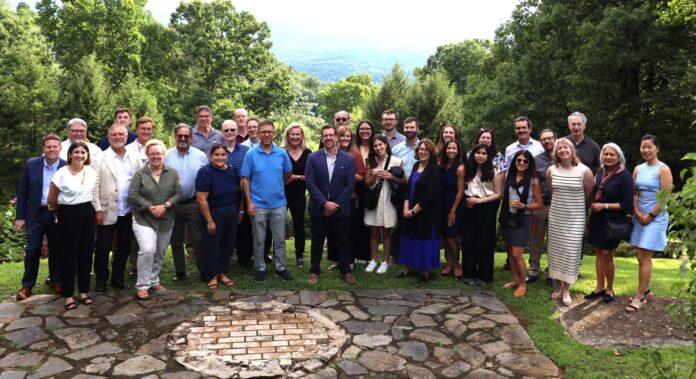Established in 1914, the Governmental Research Association (GRA) is a national group of organizations and individuals professionally engaged in public policy, governmental, and civic research.
In 2024, 28 member organizations in 17 states are part of the GRA, all studying the most important policy issues facing our municipalities, regions, and states.
In July, EdNC hosted the annual conference in Asheville, and experts from across the member organizations were joined by leaders from the Federal Reserve Bank of Richmond, the National League of Cities, Pew Charitable Trusts, the Governmental Accounting Standards Board (GASB), and NOAA’s National Centers for Environmental Information to talk about economic prosperity through the lenses of housing, early education, workforce development, and climate change.
A trip to Canton — the site of the state’s largest layoff in 2023 — allowed the researchers to think about the challenges of economic prosperity through a rural case study.
The conference also provides member organizations an opportunity to gain collective upskilling, to work in small groups based on roles (presidents, researchers, and operations), and to celebrate each other’s leadership and work with annual awards.
This conference roundup includes the slides so you can use the information shared in your own work.
Changing public policy requires leadership across the most pressing issues
Jack Cecil, the chair of the Dogwood Health Trust, welcomed the GRA to Western North Carolina and talked about his lessons learned leading across the business, nonprofit, and philanthropic sectors in North Carolina.
Cecil says of his cross-sector leadership roles, “I was just trying to figure out how the world worked.”
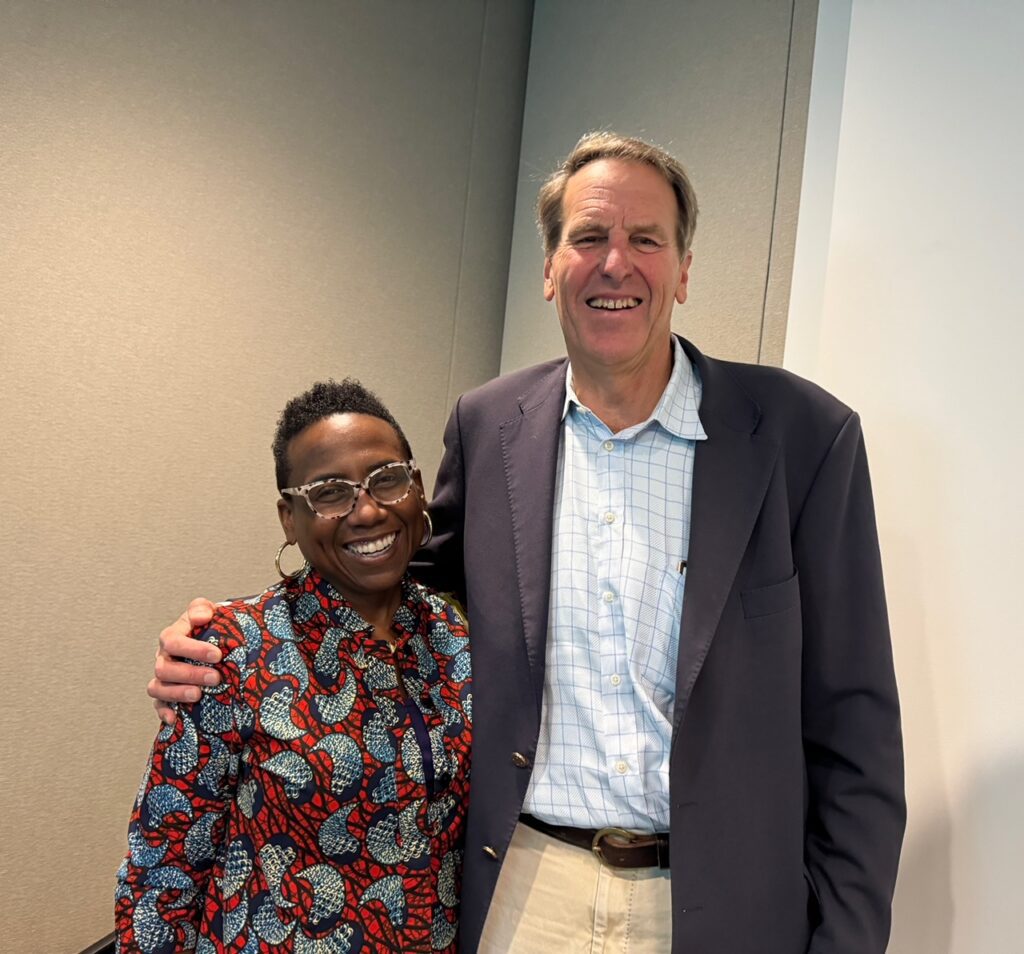

Housing matters
This year, EdNC piloted collective research with GRA organizations with this deep dive into housing in North Carolina, Tennessee, Alabama, and Louisiana down to the census tract.
At the conference, a panel on housing equity and affordability included:
- Jeff Hornstein with the Economy League of Greater Philadelphia, discussing the report, “Know Your Price, Philadelphia: An Analysis of Property Values by Neighborhood and Race, 1950-2022;”
- Phyllis Resnick of Colorado Futures, discussing the report, “Housing Affordability: Focusing on Where the Need is Greatest;”
- Shawn Teigan of the Utah Foundation, discussing the report, “Priced Out and Fed Up: Cost of Living and Government Dysfunction are Voters’ Top Issues;”
- Paul Matthews with the Worcester Regional Research Bureau, discussing the report, “Static Income, Rising Costs: Renting in the Heart of the Commonwealth.”
In Colorado, Resnick said, “47% of our state is living on household incomes of $75,000 or less, and if you’re there, housing truly is a unicorn. There is almost nothing available.”
Here are the slides.
Early childhood care and education matters

The GRA conference features member spotlights as a way to get to know each other better. This year, Doug Howgate, president of the Massachusetts Taxpayers Foundation (MTF), joined us to talk about how his organization thought about moving into the issue of early childhood care and education.
Historically, budget and tax issues were the “bread and butter” of MTA. “Early ed was new for us,” Howgate said.
Howgate talked about how he aligned the organization’s mission and financial support to build trust internally and externally, allowing him to bring the organization’s credibility and expertise on fiscal policy to bear on a new but important issue in the state, ultimately improving public policy.

EdNC’s Katie Dukes moderated a panel looking at investments in early childhood care and education, including:
Dukes said that “systemic problems require systemic solutions,” and Lavender reminded us that in the meantime, this work happens locally on the ground with parents and providers.
Here are the slides.
Our climate matters

Did you know that NOAA’s National Centers for Environmental Information (NCEI) is headquartered in Asheville?
Derek (Deke) Arndt, the director, joined us at the conference to discuss climate data and NCEI’s ecosystem of partners. Check out this chart how data is created:
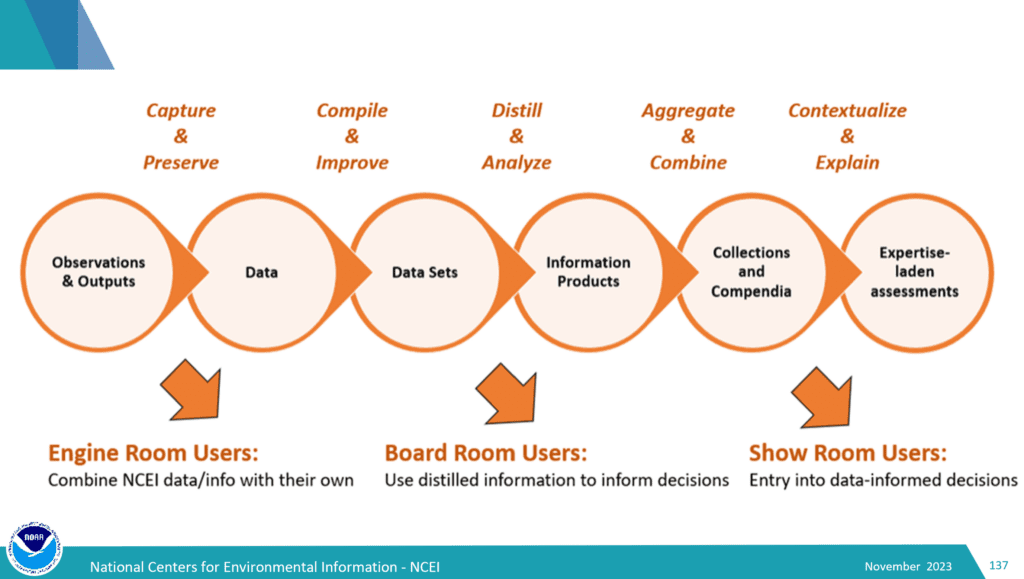
Arndt shared important resources for researchers, including state climate summaries, this dashboard on billion dollar weather and climate disasters, and the fifth national climate assessment, which is “the U.S. Government’s preeminent report on climate change impacts, risks, and responses.”
Including rural people and places in public policy research
GRA researchers visited Haywood Community College, including their Regional Center for the Advancement of Children, and Canton, where Mayor Zeb Smith welcomed everyone.
“What you do matters,” said Smathers, who talked about how public policy research will guide the building of the “hometown of tomorrow.”

EdNC’s Emily Thomas led a panel on the role of community colleges in workforce development, including:
Connections matter in workforce development, Effler said, adding “we must be a connector in community, and we must foster strong, collaborative relationships.”
“Our communities in rural North Carolina must support from within,” she said.
The fundamental focus must be on workforce development, said Effler, “what threatens, what supports, what strengthens the workforce of our future.”
Josh Goodman, a former reporter and now researcher at Pew Charitable Trusts, discussed how states can better direct economic development to places and people in need, outlining strategies to strengthen place-based programs and better support distressed areas. See this report for more information.
Changing public policy requires ongoing professional development
Like all businesses that have to iterate their operations relative to political, societal, technological, and economic shifts, the work of public policy research is changing.
We have a whole lot of new tools in our toolbox from how we do our work to how we publish our work to how we disseminate our work to how we provide independent public policy research on the issues being surfaced by the news.
The challenge is how to perform best in a constant state of change from staffing to funding to board structure — and that’s where being in relationship with other leaders and organizations helps us equip ourselves to be change managers.
At the GRA conference this year, upskilling sessions including coaching for CEOs, the team, and the board; revenue models; board governance; the all-important search engine optimization; and how to practically weave diversity, equity, and inclusion into our work.
Celebrating our leadership and research … and time together
The Annual Awards Gala

At the annual conference, the GRA confers awards for lifetime achievement, most distinguished research, outstanding policy achievement, most effective education of the public, and best communications. You can see who won what in this press release.
A special congratulations to Nancy Rose and Kriss Sjoblom, who were honored with the GRA’s highest honor, the Gruenberg Award for lifetime achievement. Read Nancy’s remarks and more on her 34 years of service to North Carolina.
Stephanie Norris, an economist with the Federal Reserve Bank of Richmond, presented the keynote address on insights into the future of the labor force. Stay tuned for more from EdNC on her insights.
Time together allows us to strengthen relationships and align our leadership
Annually creating space to celebrate our work and learn from each other allows us to align our leadership across this country where we collectively hope to make a difference — even more so in these polarized and politicized times.
From Green Man Brewery to Taco Billy to Southern Porch, it’s also fun to invest in the regional economy and share our favorite place to eat.
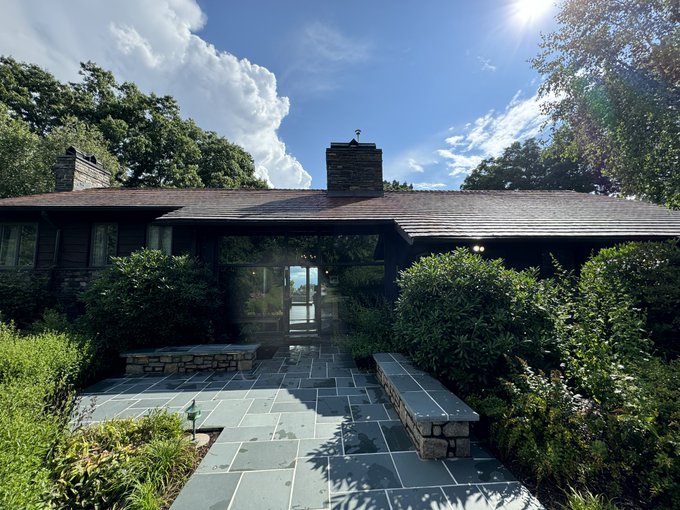


Shout out to Chris Cooper for joining us for a spectacular debrief on the 2024 elections at the Governor’s Western Residence.

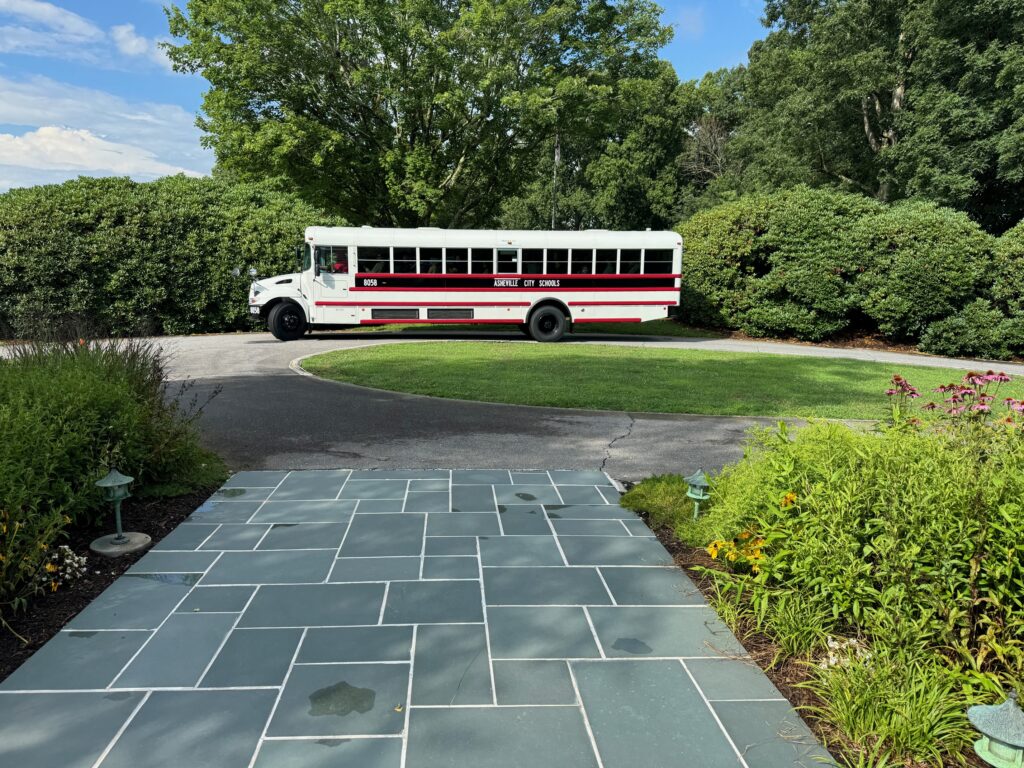

Thank you to Explore Asheville for your support of the GRA conference. A special thanks to Haywood County Schools and Asheville City Schools for literally moving us! And thank you to EdNC’s Caroline Parker and Lauren Castillo for making it happen with grace and an attention to detail that you bring without compare.
Here are all of the slides from the 2024 conference. Consider this an invitation to join us next year.


